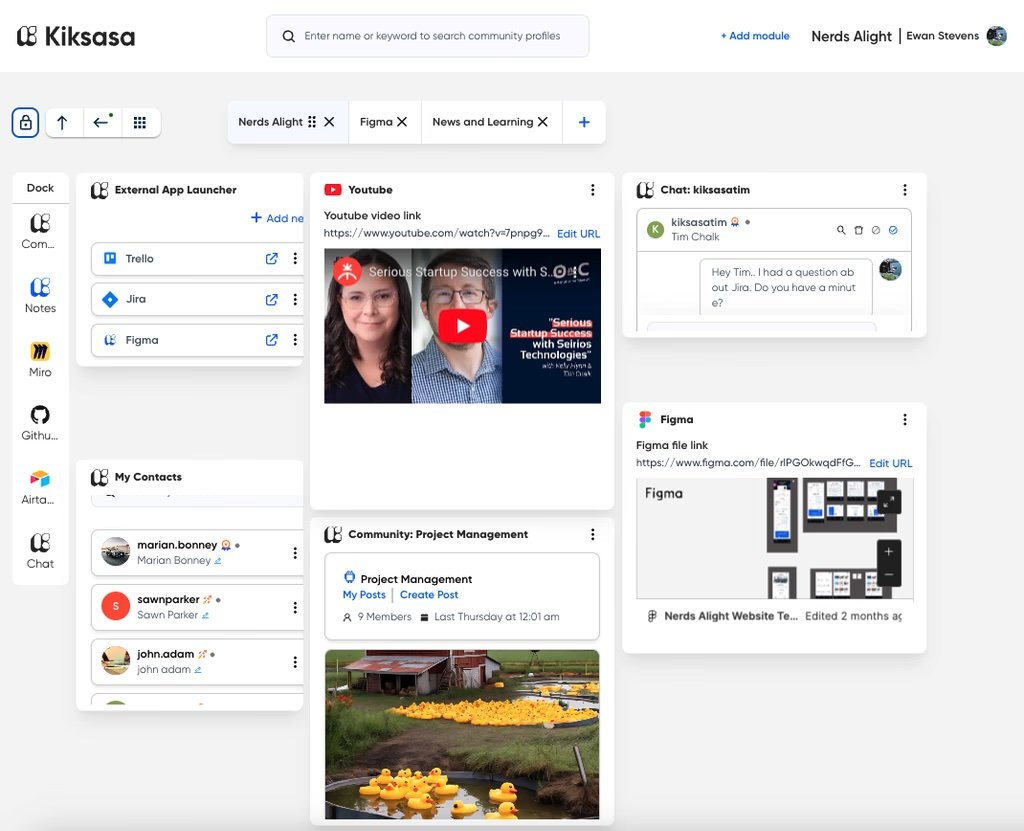A question for startup founders: How many software subscriptions do you and your team have?
Chances are, your team spends their day bouncing between Slack, email, HubSpot, Notion, LinkedIn, a few different project management tools, and whatever platform your code is stored on.
But as metro Atlanta founders Kelly Flynn and Tim Chalk learned throughout their startup careers, the reality is that most startup teams only use a fraction of each platform’s functionality. Too often, they end up cobbling together piecemeal workflows spread across multiple platforms. And that can be a costly way to get a startup up and running.
Flynn and Chalk thought there must be a better way for startups to get the resources they needed all in one place, so they set out to build Kiksasa, which they describe as a “super app for the startup community.”
The Kiksasa platform is a mix of native applications and integrations with third-party applications. Note-taking, task management, knowledge sharing and chat apps are all native applications. The integrations are focused on “startup-focused apps with great free plans, like Miro, Figma, Replit, Pitch and Box,” Flynn told Hypepotamus.
Kiksasa hubs can be organized and curated to suit each individual’s needs.

Kiksasa was purposefully built with only the tools its founders absolutely needed to build. This “minimum viable product” approach allows the Kiksasa team to rapidly roll out new features.
But importantly, Kiksasa goes a step further by focusing on networking and community to help founders on their product development journey. Users can see who the experts are on the platform who can answer their technical and business questions. This allows founders to grow their network without spending hours at in-person events or doing tedious cold outreach on LinkedIn.
The team is focused on supporting founders, which is why they offer their platform for free to solo founders and small teams.

Building products for startups
Ultimately, the team sees the platform as a way to “level the playing field” within the startup ecosystem.

“Fundamentally, we [people] “We’ve been building startups the exact same way, with the exact same tools, for the last 30 years, since the modern incubator and accelerator movement began,” Flynn told Hypepotamus. “We’ve been doing the same thing over and over again, and the success rate numbers haven’t changed. The statistics haven’t changed.”
The statistics she mentions are all too familiar to startup founders: Over 90% of startups fail within the first five years of business. Only 0.05% of startups ever secure venture capital. And the numbers are even lower for companies with women, minorities, and non-traditional founders.
Sure, there seem to be countless accelerators trying to help startup founders. But Flynn and Chalk have always found that these programs often don’t provide founders with the support they need. The team sees Kiksasa’s toolkit and community hub as a way to fill that gap and provide all founders with the resources they need.
Get to know the team

Chalk and Flynn met six years ago and co-founded startup consulting firm Seirios Technologies four years ago.
A graduate of Georgia Tech, Chalk has bounced between startups and larger companies like NCR throughout his career. He joined his first startup, Atlanta-based Firethorne, in 2006 and stayed on after the team was acquired by Qualcomm. He also worked at other payments startups in the city, including ConexPay and BancoPayments. Flynn has worked in the technology industry for 25 years, and his career has taken him to 20 countries around the world.
Prior to founding Kiksasa, Flynn launched four startups in technology and environmental science.
—
The article has been edited with additional information from the Kiksasa team.
Photo courtesy of Kiksasa

